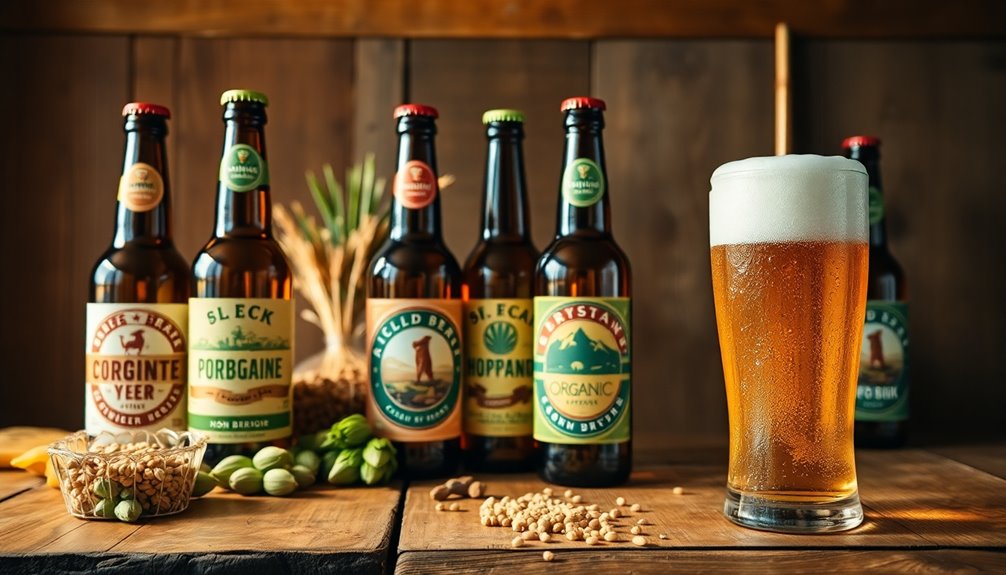In 2024, non-GMO beers are popping up with exciting new flavors and sustainable practices. You'll want to try Heineken Light, Bud Light Next, and Blue Moon LightSky for their great taste and natural ingredients. If you're interested in non-alcoholic options, check out Sierra Nevada's Trail Pass or IMPOSSIBREW for a unique twist. These brews reflect a growing trend towards healthier choices and traditional methods. As breweries continue to innovate, you can expect even more delightful surprises. Keep exploring to discover what else this refreshing beer trend has to offer this year!
Key Takeaways
- Heineken Light and Bud Light Next remain popular choices, catering to those seeking low-calorie, non-GMO options in 2024.
- Blue Moon LightSky offers a refreshing twist with tangerine notes while adhering to non-GMO standards.
- Craft breweries are innovating with unique flavors, utilizing ingredients like turmeric and blueberries to attract health-conscious consumers.
- Non-alcoholic options like Sierra Nevada's Trail Pass and Grüvi's Juicy Dayz IPA are gaining traction among the sober curious crowd.
- Sustainable practices, including local sourcing and renewable energy, enhance the appeal of non-GMO beers in 2024.
Understanding Non-GMO Certification
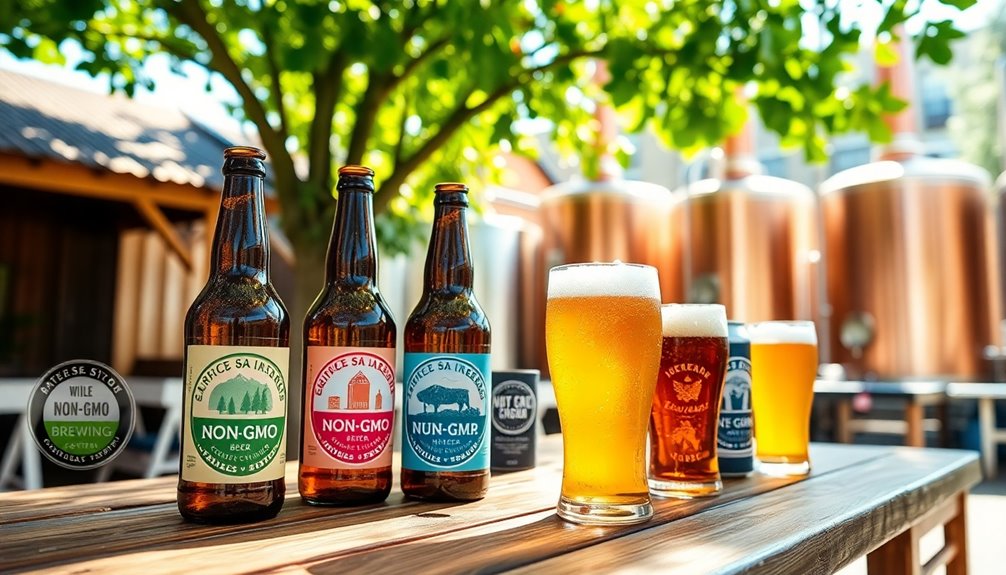
When you're navigating the world of non-GMO beers, understanding non-GMO certification is essential. This certification process involves companies submitting an application to a certifying body, detailing their manufacturing processes, products, and company information.
They must provide thorough documentation, including ingredient lists and production records, to demonstrate compliance with non-GMO standards. Testing plays a significant role in this process. Accredited laboratories analyze products to confirm they meet established non-GMO threshold levels. Additionally, the certification assures consumers of product integrity and non-GMO status, which is increasingly important in today's market.
The certifying body then reviews both the documentation and testing results to ensure everything aligns with non-GMO standards. If successful, the company receives non-GMO certification.
Maintaining this certification requires ongoing compliance. Companies need to regularly test their products and update their documentation, reflecting any changes in ingredients or processes. Annual audits may take place to verify continued adherence to these standards.
Additionally, implementing proper segregation and traceability systems is crucial for preventing cross-contamination with GMOs. Sourcing high-quality non-GMO ingredients from trustworthy suppliers, who can guarantee their products haven't undergone genetic modification, further strengthens a company's non-GMO standing.
Understanding these steps will help you appreciate the integrity of non-GMO beers.
Top Non-GMO Beers to Try
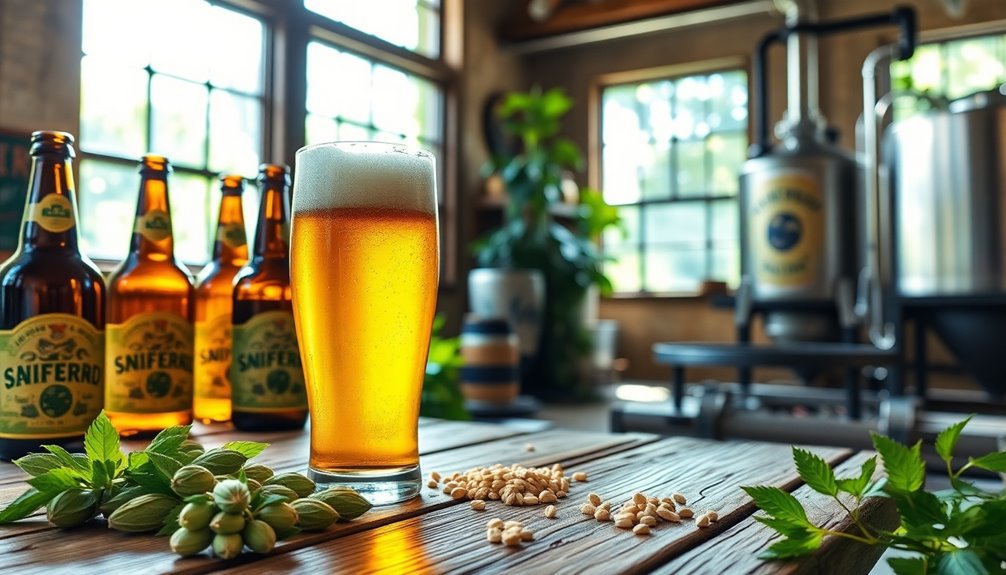
If you're on the hunt for great non-GMO beers, there are some fantastic options to consider. Heineken Light is a standout with its non-GMO wheat, yeast, and hops, boasting just 90 calories and 3.3% ABV.
For a lighter choice, Bud Light Next offers zero carbs and only 80 calories, perfect for those seeking a crisper experience. Blue Moon LightSky presents a low-carb option at 100 calories, enticing you with notes of tangerine and tropical hops.
If you're looking for something gluten-free, try Ghostfish Shrouded Summit White Ale, crafted from millet, rice, and buckwheat. It has 125 calories and 4.5% ABV, making it a refreshing choice. Moderate beer consumption can also enhance gut microbiota, potentially functioning similarly to probiotic supplements, which adds to its appeal.
Hoegaarden Original White Ale, while not explicitly labeled non-GMO, is known for its gut health benefits, adding another layer of appeal.
As you explore these options, keep in mind that many craft breweries are now focusing on sustainability and may incorporate non-GMO ingredients.
The demand for health-conscious beers is rising, paving the way for more exciting non-GMO brews in the future. Enjoy your tasting journey!
Innovative Non-Alcoholic Options
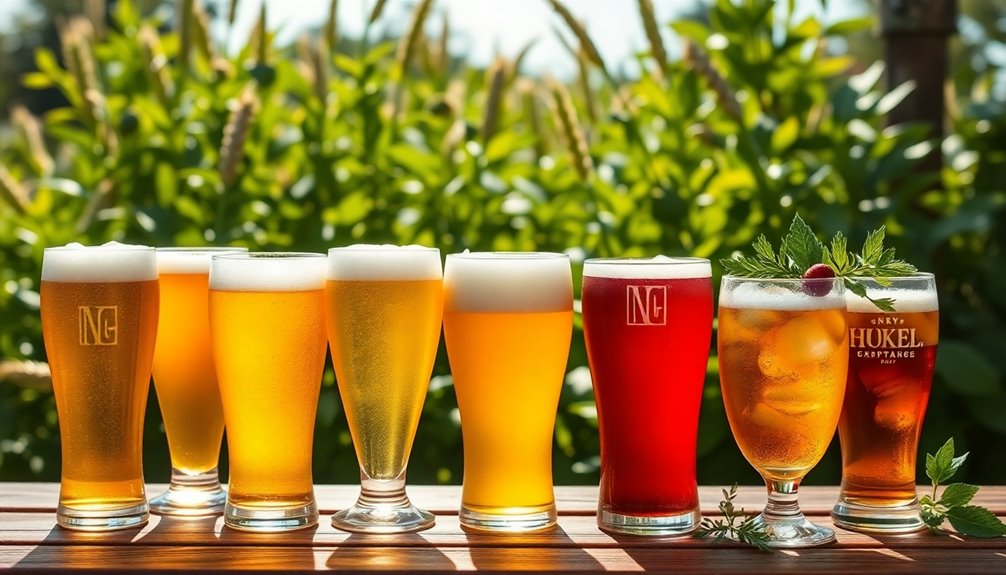
Innovative non-alcoholic options are transforming the beverage landscape, giving you a variety of exciting choices that don't compromise on flavor.
Breweries are employing cryogenic and cold contact fermentation techniques, allowing them to create rich, beer-like flavors while keeping alcohol content low. For instance, specialized yeast strains help maintain fermentations below 0.5% ABV, ensuring a clean taste without off-flavors. The market for non-alcoholic beer is expected to see an annual growth of 3.75% CAGR from 2024-2029, highlighting the increasing consumer interest in these beverages.
You can explore hoppy IPAs like Sierra Nevada's Trail Pass or Grüvi's Juicy Dayz IPA, both bursting with citrus and tropical notes. If you prefer something more traditional, Nialas Latitude offers a satisfying lager experience with cracker and wheat notes.
Brands are also innovating with ingredients; IMPOSSIBREW combines nootropics like L-Theanine for relaxation without the alcohol buzz.
The growing demand for high-quality, flavorful non-alcoholic beers has even major brands like Guinness and Sierra Nevada entering the market.
With options like Visitor Brewing's Extra, which is gluten-reduced, and the experimental Dry Run Series from Momentum Brewery, there's a non-alcoholic brew to suit every palate.
Embrace these innovations and enjoy the best of both worlds!
Sustainable Brewing Practices

Sustainable brewing practices are becoming essential in the industry as breweries strive to minimize their environmental impact. You'll find many breweries implementing innovative measures to reduce water consumption and waste.
For instance, Full Sail Brewing captures and reuses water, saving millions of gallons each year, while Karbach Brewing optimizes its cleaning processes to achieve a lower water-to-beer ratio.
Energy consumption is another focus area. Breweries are installing energy-efficient equipment and turning to renewable sources like solar and wind power. In fact, the brewing industry aims for 100% renewable energy by 2030.
Full Sail Brewing, for example, uses glycol chillers with heat exchangers to cut down on cooling water usage.
Sourcing local and organic ingredients is also a priority. By partnering with local farmers, breweries reduce their carbon footprint and support the community.
Cape Cod Beer donates leftover grain for animal feed, creating a closed-loop system that benefits both the brewery and local agriculture.
Finally, implementing closed-loop systems helps breweries capture and reuse waste materials.
Stone Brewing has even achieved zero wastewater discharge on most days, showcasing that sustainable practices can lead to significant environmental benefits while still producing great beers.
Consumer Trends in Non-GMO Beers
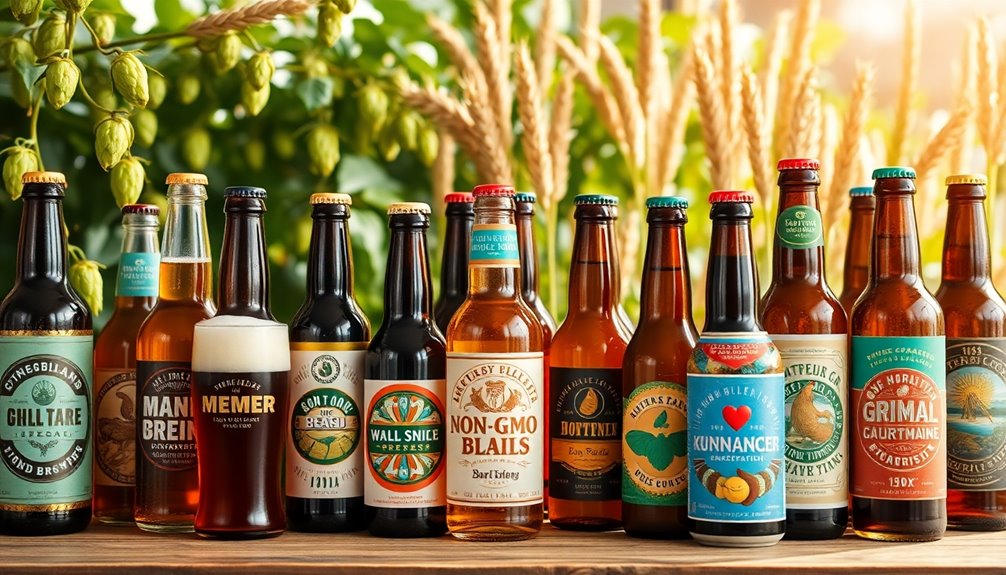
The demand for non-GMO beers is rapidly increasing as consumers seek natural and wholesome ingredients in their beverages. You're part of a growing movement that prioritizes health and wellness, driving this trend. Concerns about genetically modified ingredients have led many to return to traditional brewing methods, emphasizing natural yeasts and locally sourced ingredients that support local farmers. Additionally, as craft lagers gain popularity, more breweries are exploring non-GMO options within this category.
Another trend shaping this landscape is the rise of non-alcoholic and low-ABV options. With non-alcoholic beer sales skyrocketing, it's clear that many of you're embracing the "sober curious" movement, reducing alcohol consumption while still enjoying great flavors. Breweries are responding with innovative NA versions of popular beers, catering to your taste for variety.
Flavor and style innovations also play a significant role in non-GMO beers. Craft breweries are experimenting with unique profiles using ingredients like turmeric, ginger, and blueberries.
You might notice an increased interest in regional and international styles, as well as flavored malt beverages that are gaining traction.
As consumer demand influences inventory choices in bars and restaurants, it's an exciting time to explore the diverse world of non-GMO beers that align with your values and preferences.
Frequently Asked Questions
What Are the Health Benefits of Drinking Non-Gmo Beers?
Drinking non-GMO beers can offer several health benefits. You might find they help boost your heart health by increasing HDL cholesterol levels.
These beers often contain polyphenols, which have anti-inflammatory properties. When consumed in moderation, non-GMO beers can fit into a healthy lifestyle, as they typically avoid excessive calories, carbs, and artificial additives.
Plus, they're made with natural ingredients, making them a flavorful choice without compromising your health. Enjoy responsibly!
How Can Consumers Identify Non-Gmo Beers in Stores?
To identify non-GMO beers in stores, look for the Non-GMO Project Verified seal on labels, which indicates the beer meets strict non-GMO standards.
You can also check for USDA Organic certification, as organic products can't contain GMOs.
Research breweries online; many share their non-GMO commitments and ingredient sourcing.
Don't hesitate to ask staff in specialty beverage sections for recommendations on non-GMO options—they're often knowledgeable about the products they carry.
Are Non-Gmo Beers More Expensive Than Regular Beers?
Yes, non-GMO beers are generally more expensive than regular beers.
This price difference often stems from the higher production costs associated with sourcing quality ingredients and managing organic farming practices.
You might notice that while conventional beers use cheaper additives, non-GMO options prioritize quality and sourcing, which can drive up prices.
Do Non-Gmo Beers Have Different Taste Profiles?
Yes, non-GMO beers do have different taste profiles.
You'll notice they often showcase more traditional and authentic flavors, thanks to natural ingredients like organic hops and malts.
The absence of genetically modified yeast means you're tasting pure, natural fermentation.
While non-GMO beers might lack some novel flavors found in genetically engineered options, their nuanced profiles often highlight the unique characteristics of the ingredients, giving you a distinct and wholesome drinking experience.
Can I Brew My Own Non-Gmo Beer at Home?
Absolutely, you can brew your own non-GMO beer at home!
Start by sourcing certified non-GMO grains, hops, and yeast, preferably from local farmers.
Keep your recipe simple and use organic ingredients for the best flavor.
Ensure proper sanitization of your equipment to avoid contamination.
By following traditional brewing techniques and focusing on sustainable practices, you'll create a delicious beer that reflects your commitment to quality and authenticity.
Enjoy the brewing process!
Conclusion
As you explore the world of non-GMO beers, you'll discover exciting new flavors and sustainable brewing practices that align with your values. From innovative non-alcoholic options to the latest brews hitting the market in 2024, there's something for everyone. Embrace these unique choices and support brands committed to quality and transparency. Cheers to making informed choices and enjoying every sip of your favorite non-GMO beer!



